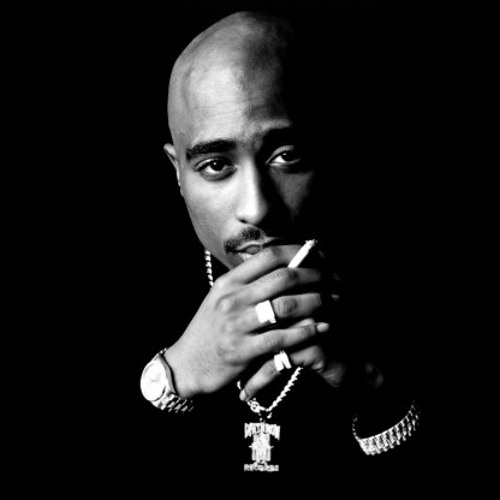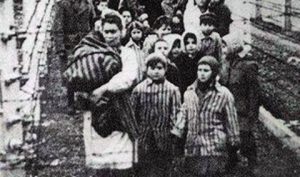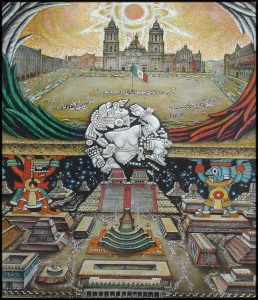Close your eyes and flashback to Harlem, New York in the 1970’s; you hear the unique dialect of thugs, pimps, and prostitutes alongside the upbeat rhythm of culture-rich music. You hear the tension of drug deals, the cries of hungry homeless children out in the cold, and the crackling of the fires of buildings being burnt down and soon to be abandoned. You hear police sirens fill the streets, and the cracking of police batons on the ribs of individuals who plead their innocence. But more importantly, you hear the silent screams of the oppressed on their last straw. Right smack in the middle of this revolutionary explosion, in 1971, was born Lesane Parish Crooks—the future Tupac Amaru Shakur.1

Tupac was born into a family that was deeply rooted in the Black Panther Party. The Black Panthers was a group of African Americans who wore iconic black outfits with black berets and emphasized “black pride.” They fiercely fought for human and civil rights, but more importantly, against police brutality. Although a social movement, they stood out from other movements of that time because, unlike other groups, they used violence to rebel. It was founded by Huey P. Newton and existed through the 1960’s-1970’s.2 His mother, Afeni Shakur, was guilty of 156 counts of crime due to her involvement with the Panther movement, and was in prison while pregnant with Tupac. Although lacking a high school degree, Afeni was incredibly smart. She was known for her public speaking, and when eight months pregnant, she acted as her own lawyer and won the case, getting her released from prison on account of a lack of evidence.3 From early in his life, Tupac lacked a father figure, and it is because of this that he was especially close to his mother and had much respect for her as a single, struggling parent. His godparents, two renowned Black Panther members, Assata Shakur and Elmer “Geronimo” Pratt, had important roles to play in the Panthers organization, so one could only imagine how developed Tupac’s sense of social awareness was from a very young age.
Growing up, Tupac automatically had a love for education. He always had the self-motivation to go to school and the instinct to pursue poetry and drama. Considering his lyrical reputation, it’s no surprise that Tupac was skillfully literate, and he soon began using this talent to say what he felt needed to be said. At fourteen years old, Shakur was enrolled in Baltimore’s School for the Arts, and it was here that he started rapping, his first real rap being about gun control.4 It didn’t take long at all for him to notice flaws in the education system and want to improve it. He later commented on how, after awhile, school became so repetitive that he stopped learning things that are actually important. For example, almost every year from Kindergarten to twelfth grade, children are required to take Math, English, and History courses of some sort, each one not being very different from the last. He felt kids lacked the opportunity to learn “important things,” such as how to complete their taxes, manage finances, and more; things, for example, that revolved around having street smarts and daily practicality. He had no hesitation taking on a leadership role, and took advantage of immediately getting involved. In high school, he started campaigns educating kids about safe sex, in a neighborhood where the rate of AIDS among teenagers was very high. He and some of his friends even wanted to restart the Black Panthers. But instead of the use of violence, his goal was to use his words to get his points across. Tupac particularly emphasized the importance of education, especially among the youth, and the importance of children being raised with the necessary mindset required for bettering the future, not only for themselves but for generations to follow. He also made it known that he absolutely hated racism, deplored the mistreatment of women, and saw both as result of ignorance.5 Tupac had never lived a luxurious life, but unfortunately, he and his family were faced with sudden financial difficulties. His mother had developed a cocaine addiction, due to her involvement with one of her ex-Panther friends. As her addiction worsened, she became unable to hold a job. This caused Tupac’s family to lose the privilege of being able to stay in one place for long. They had to keep moving, from Harlem to Baltimore, then to California, until they were eventually homeless. In 1988, at seventeen years old, Tupac was eventually forced to drop out of school and start selling drugs to pay the bills and support his family.6

Thankfully, a couple years later, in 1990, Tupac joined the HipHop group Digital Underground, and became a background dancer for them. He was also getting roles in movies, such as Ernest Dickerson’s film Juice.7 Tupac was juggling acting as well as rapping, with both really putting his name in the entertainment realm. His rap career really took off in 1991 when his first solo debut album, 2Pacalypse Now, was released.8 In this album, he raps about life in the streets for African Americans, especially in regards to police brutality, poverty, and the war on drugs. It was a real contrast to the stereotypes that rap just contained vulgarity and glamorized delinquent behavior. His frank tone and attitude immediately drew a lot of attention towards these hypersensitive topics, which were otherwise overlooked. Tupac Shakur was giving a new name to Gangsta Rap.9
2Pacalyse Now was arguably the most revolutionary compilation of Tupac’s career, because it sparked such a wide variety of emotions. In this album, not only did he identify problems of the ghetto, but he gave reasoning as to why they persisted, as well as even giving viable solutions, with his most emphasized solution being education. In his song, “Rebel of the Underground,” Shakur states,
“The most dangerous weapon: an educated black man.”10
Also in his 2Pacalypse Now album, in his song “Violent,” he talks about his blunt attitude, and his persistence to expose issues of the ghetto was being confused for violence. In this song, he states,
“They claim I’m violent just because I refuse to be silent…I will rebel against any oppressor and this is known as self defense…Unlock my brain, break the chains of your misery…My words are weapons and I’m steppin to the silent… Wakin up the masses, but you claim I’m violent.”11
Another profound piece on this album was his song “Words of Wisdom,” in which he directly speaks to those who are socially oppressed; more specifically, the African Americans of the lower class. He directly calls out problems regarding drugs, economic inequality among the classes, and how the education of kids in the ghetto is neglected. In this song, he states,
“It’s wrong to keep someone from learning something. I’m fed up, we gotta start teaching children that they can be all that they wanna be. There’s much more to life than just poverty…Conquer the enemy armed with education. Armed with the knowledge of the place we’ve been, no one will ever oppress this race again.”12
By the age of twenty years old, Tupac Shakur was not only changing a whole genre of music as we knew it, but approaching nationwide issues as no one had approached them before. He was changing the way people thought, how they looked at themselves, their place in society, and the importance of things such as education. He was doing all this through his words. Tupac once stated, “I’m not saying I’m going to rule the world or I’m going to change the world, but I guarantee that I will spark the brain that will change the world.”13 Although he died just five years after the release of his first album, his legacy still lives on today in the minds of those who wish to better the lives of the indigent youth. What do you say? Do you have the spark to change the world?
- Michael Dyson, Holler if You Hear Me (New York: Basic Civitas Books, 2001.), 6. ↵
- Encyclopedia of Activism and Social Justice, 2007, s.v. “Black Panther Party,” by Gary L. Anderson and Kathryn G. Herr. ↵
- Encyclopedia of African American History, 2010, s.v. “Shakur, Tupac,” by Aaron D. Sachs. ↵
- Encyclopedia of African American History, 2010, s.v. “Shakur, Tupac,” by Aaron D. Sachs. ↵
- Historic Films Stock Footage Archive, “Tupac Shakur 1988 High School Interview,” YouTube Video, 36:01, June 12, 2017, https://www.youtube.com/watch?v=v_XT9-C5Qu8&t=82s. ↵
- Encyclopedia of African American History 1896 to the Present, 2009, s.v. “Shakur, Tupac,” by Akil Houston. ↵
- Encyclopedia of African American History 1896 to the Present, 2009, s.v. “Shakur, Tupac,” by Akil Houston. ↵
- St. James Encyclopedia of Popular Culture, 2013, s.v. “Shakur, Tupac (1971-1996),” by Pierre-Damien Mvuyekure. ↵
- Simon Glickman, Tupac Amaru Shakur (Detroit: Gale, 2003), 26-27. ↵
- Anton Larson, “2Pac-Rebel of the Underground (lyrics on screen), YouTube Video, 3:11, May 11, 2012, https://www.youtube.com/watch?v=HKF_FZUjts4. ↵
- artfulgooner, “Tupac Violent Lyric Video,” YouTube Video, 6:27, May 6, 2013, https://www.youtube.com/watch?v=EKW3ps02L_o ↵
- 2Pac4ever, “2Pac-Words of Wisdom with lyrics,” YouTube Video, 4:54, January 7, 2016, https://www.youtube.com/watch?v=EsOVlPKyUME ↵
- EducateInspireChangeTV, “I Will Spark The Brain That Will Change The World-Tupac,” YouTube Video, 1:42, September 15, 2014, https://www.youtube.com/watch?v=uijBebYpoto. ↵



96 comments
Rebeca Escobar
Truly a figure and individual that we need today in these times where so many people lack compassion. His music is good, but even more importantly, Shakur’s heart was always in the right place. His mother is also someone to be commended and I admire her intelligence and how brilliant she was. Shakurs story reminds me strongly of Nipsey Hussle, who was just shot and killed recently. Like Shakur, Hussle was a rapper who did nothing but give back and love his community. I’m saddened that individuals like these are often targeted and killed.
Averie Mendez
I loved the introduction to this article! It felt very powerful. I grew up listening to Tupac with my father, but didn’t know much about him beyond his music, so this article was very interesting to read. Reading about what a powerful woman his mother was shed light on how true the lyrics to Dear Mama were. I also had no idea that Tupac was such an activist, besides being an upcoming artist. It’s heartbreaking that we lost him so soon, but may his legacy live forever.
Sarah Uhlig
Reading about this man’s passion for education and how he gave back to people in his own community was very inspiring. People like Tupac really make a good impression on the younger audience by being the role model who took care of business in school and still became successful in his dreams of rapping. I enjoyed reading this article because of the interesting and motivational story that was lined out above.
Nawaf Almarwaie
one of the most important reasons that makes me appreciate Tupac because he always talks about society and human’s problems. i like to see famous people do not just live their own lives with a lot of money without thinking of other’s people problems. the drugs, gangs, and other harmful situations that Tupac talks about became a serious problem in his society and he is trying to grab people attentions to this kind of problems in order to solve it not only for our benefits but also for the following generations.
Leonardo Gallegos
Tupac’s messages in every song are very impactful to me because he really emphasizes on world issues. I truly like that he was not selfish and that he never claimed that he himself would save the world, but he did guarantee that it would “spark” someone’s brain to do so. His great influence is apparent in today’s hip pop community with artists such as J Cole and Kendrick Lamar that really bring awareness to their audience about issues around the globe. Great Article!
Ruben Basaldu
I am not too familiar with Tupac’s but I really do appreciate as to when an artist focusses on the important things to talk about in their songs. He wanted to tell people what was really going on and that is something that I can really appreciate. Societal issues were a very real thing that was happening at this time and it seems like no one was really wanting to talk about it but Tupac felt as if it was necessary to do so. I would start listening to him now because of what his messages are and I think that I would be a fan.
Samire Adam
Tupac was one of the greatest rappers and writers of his time. What many do not know is that Tupac was a great human being whose childhood was under extreme circumstances. Tupac was able to become a big fish in a little pond and become who is known as today. I really liked this article because it was able to point this out. I believe that someone who does listen to Tupac Shakur would still learn something by reading this article.
Gabriela Murillo Diaz
I am a huge Tupac fan and loved the article! I grew up listening to his music and knew a lot about his history already. There was some information I did not know that only made me enjoy the article more. The discussion about his influence in music was very interesting because Tupac really did shake things in rap music. His music was meant to bring awareness to all the issues that were occurring in our neighborhood and I think he did that well. I think that his music is timeless because the words he rapped can still be seen today.
Arieana Martinez
Tupac was one of the most controversial, and my favorite, rappers of all time. He (quite literally) fought and preached for what he believed in, just like his mother. Tupac was unafraid of the opposing forces facing him. He knew his influence, and used it to spread awareness of the world about the message of helping others and not discriminating against others who are unlike us. Tupac was one of the most inspirational rappers who knew what was right, and practiced what he preached every day. This article embodied just that. Great read.
Robert Ruiz
This article gave a good snapshot of the life of Tupac in a whole different way. I really enjoyed reading it in this light. I knew that his mother was involved in the Black Panther movements but I did not know that more of his family was and how involved they were. I also thought it was interesting that you put the lyric in your article as well. I felt it was way to get more of the meaning of what he was saying by reading it like you would a poem. Overall, i really enjoyed reading your article and though you did well.